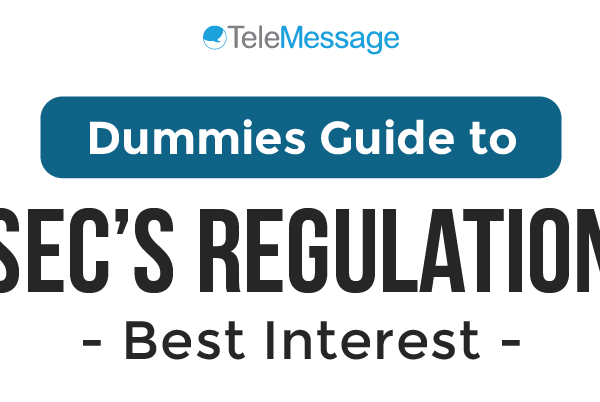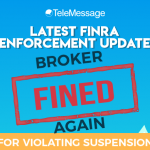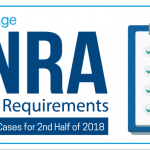The rigorous and complex text message archiving requirements of SEC and FINRA weigh on the minds of compliance officers and executives in the U.S. financial services sector. Aside from requiring firms to capture mobile text, record voice calls, and other forms of mobile conversations and subsequently store them in an unalterable WORM format, the regulators also require them to be able to monitor and review these conversations in a very timely manner.
Such a requirement to proactively monitor all mobile communications of financial advisors and broker-dealers has proven to be a challenge.
Finding the equilibrium between robust monitoring of potential illegal trade activities and minimizing tedious false positives is not as easy as the laws and regulations indicate it to be. Regardless, it’s imperative for firms to master their mobile communications governance not only to stay compliant but also to leverage insights which can make their workforce more productive and ensure an efficient external and internal workplace communication process.
Identify Compliance High-Risk Areas
The first step to achieving efficient mobile communications monitoring is to work with a financial compliance expert to identify and list all high-risk areas related to your business. Often, these areas include those frequently inspected by OCIE, fraud alerts issued by SEC and FINRA, advisory insights, and enforcement priorities, along with advisors or broker-dealers trade activities.
Knowing these areas will help you streamline your mobile communications monitoring by allowing to exclude correspondence from real-time supervision such as text message trade reminders frequently sent to all clients of your company.
Focus on High-Risk Employees
Aside from determining areas where non-compliant activities could likely arise, it’s also important to identify the employees who are likely to commit them. The best way to spot high-risk employees, aside from the level of exposure with the clients, is through their behavior. Have they got involved in a clash with authority recently? Is their performance declining for past months? Are there any indications of excessive business-related activity outside normal work hours?
Other characteristics of high-risk employees include:
- Disgruntled – Employees that feel personally disregarded at work, or had a negative encounter with managers over benefits, time offs, transfer or other similar issues.
- Profit-seeking – Employees that might conduct illegal activity through mobile communications such as colluding with the external trader or stealing client data to make money.
- Moving to a competitor or starting a new business – An employee that soon will start a new job for a competitor or might use internal business communication to build leverage on their new business.
Refine Keywords That Denotes Suspicious Conversations
Most financial firms turn to often-flagged keywords and phrases and use mobile monitoring technology to continuously detect conversations where those lexicons appear in their archiving database.
While having a list of keywords and phrases could significantly help in deterring employees from conducting illegal activities through mobile text, it will be more efficient if the list consists of only a maximum of 15 highly-refined keywords to avoid getting false positives that you won’t be able to scrutinize effectively.
It would also be helpful if your mobile archiving solution can be programmed to skip certain keywords such as “buy” or “sell” found within standard business correspondence sent to a distribution list, but at the same time flag keywords such as “just between two of us” or “call me at home”. Doing so will help ensure that your monitoring efforts are maximized on correspondences that need the most attention.
All in all, proactive mobile communications monitoring is a critical aspect of reducing costs associated with non-compliance to SEC and FINRA text archiving regulations. However, that’s only one of the reasons why financial firms need a mobile archiving solution. More than cost, being able to flag suspicious illegal activities or employee misconduct is critical to protecting the company’s reputation for the long haul.
Consider Using Speech Recognition Software
Aside from text messages and chats, most employees in the financial sector use phone calls to engage their clients or discuss trade-related topics with their colleagues. Since this type of mobile channel isn’t text-based, it’s vital that you can capture and record phone calls and then process them subsequently into text using a speech-to-text software.
This, however, will require you to record voice calls to highest quality so that the text output is as accurate and precise as possible. To do so, you will need to make sure that your mobile archiving solution has voice call recording capability that can record calls at least with 24-bit rate, at a lossless audio format. This will help you detect fraudulent activities being discussed by your employees via phone calls through stream recognition feature, available with contemporary leading speech recognition software.
Conclusion
To ensure effective monitoring and supervision of all mobile communications, SEC and FINRA member firms should invest in an enterprise mobile messaging solution that will allow them to capture and record mobile SMS, record voice calls, archive WhatsApp chats, and other mobile conversations in real-time.
The TeleMessage Mobile Archiver effectively addresses compliance, regulatory, eDiscovery response requirements and reduces risk across a variety of the financial sector. TeleMessage captures and records mobile content, including SMS, MMS, voice calls, social media, and WhatsApp Chats from corporate or BYOD mobile phones. Messages are securely and reliably retained within TeleMessage servers or forwarded to an archiving data storage vendor of your choice.
Our mobile archiving products securely capture content from mobile carriers and mobile devices for a variety of ownership models (BYOD, CYOD, and employer-issued). With our multiple archiving methods, you can always find the right tools or blend for your text message archiving and voice call recording requirements:
TeleMessage offers cross-carrier and international mobile text and calls archiving for Corporate and BYOD phones. Contact us today to learn more about how we can help your organization stay compliant with SEC and FINRA text archiving regulations.




